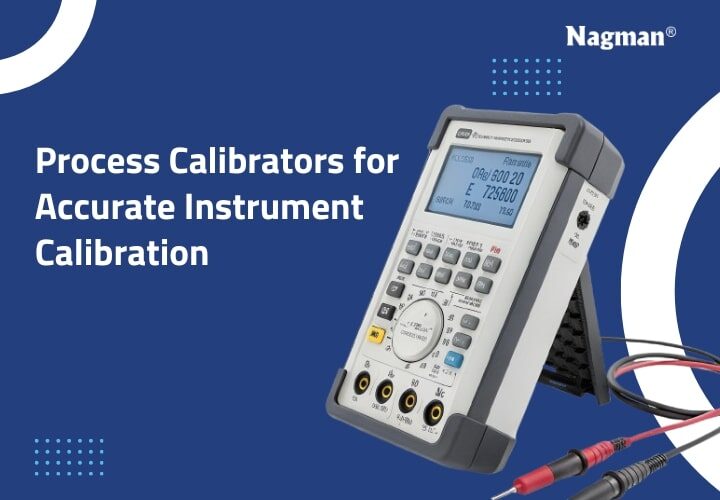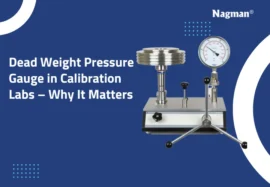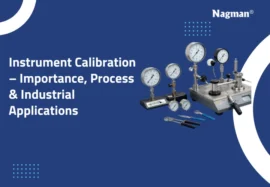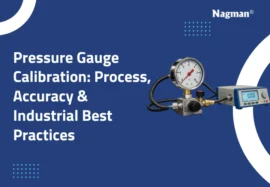Accurate measurements are crucial for safe and efficient industrial operations. Inaccurate instruments can lead to costly downtime, wasted materials, or even hazardous conditions. Process calibrators play a vital role by testing, adjusting, and verifying instrument accuracy to ensure reliable performance. This overview explores the importance of instrument calibration, its applications across industries, and how process calibrators differ from multifunction calibrators
Why Process Calibrators Are Essential in Instrument Calibration
Calibration is the process of comparing an instrument’s output with a standard reference to ensure it gives accurate readings. A process calibrator is a crucial tool, as it ensures that instruments are accurately aligned with the set standards.
Instruments may drift over time due to wear, environmental changes or even usage, leading to unreliable readings. Regular calibration is essential in industries where compliance, safety and quality guarantee operational integrity.
How Process Calibrators Work: A Simple Breakdown
The theory of how a process calibrators works is simple. These instruments produce accurate signals, such as voltage, current, resistance, or pressure, simulating conditions in real-world processes. The signals are fed into the instrument being tested, and the result is compared against expected values.
Where differences are detected, corrections are made to align the instrument to the standard measurements.
Key Features of Modern Process Calibrators
Modern process calibrators have improved with the advancements in technology.
Some of the main features are:
- High precision and stability to meet the stringent calibration needs
- Portability allows engineers to perform on-site calibrations.
- Straightforward interpretation of readings with digital displays.
- Compliance and traceability with data logging and storage capabilities.
- Multi-purpose, as it can create or measure multiple signals.
Applications of Process Calibrators in Different Industries
They can be used in various industries, such as:
Oil and gas: Ensuring pressure and temperature equipment work within safe operating limits.
Pharmaceuticals: Maintaining the high standards of accuracy needed for regulatory compliance and product safety.
Manufacturing: Checking devices that monitor the flow, temperature, and electrical indicators to maintain a steady production.
Energy production: Ensuring effective operation of power plants and substations by validating essential instruments.
Process Calibrators vs. Multifunction Calibrators: What’s the Difference?
While a process calibrator measures a specific parameter, such as pressure, temperature, or an electrical signal, a multifunction calibrator is a single device that can measure a variety of parameters. Multifunction calibrators are more versatile instruments because they can simulate and measure various kinds of signals.
However, a process calibrator may be more accurate or have specialised functionality for specific applications. The choice is frequently determined by whether the user needs versatility or precision for a given parameter.
Choosing the Right Process Calibrator for Your Needs
Choosing the right process calibrator depends on the instruments that have to be calibrated and the degree of accuracy required.
Factors to consider include:
- Range of signals to be generated or measured.
- Accuracy is needed in the application.
- Portability for fieldwork or stationary lab use.
- Connectivity options for data logging and reporting.
- Adherence to industry standards.
Benefits of Using Process Calibrators in Instrument Calibration
A process calibrator used in instrument calibration has a number of advantages, such as:
- Ensuring the accuracy and reliability of critical instruments.
- Preventing expensive downtimes due to faulty measurements.
- Supporting adherence to the regulatory standards.
- Increasing safety by ensuring the correct functioning of monitoring systems.
- Reducing the cost and time spent on frequent equipment replacements.
Common Challenges in Calibration and How Process Calibrators Help
Calibration also faces its own challenges, though. Instruments may be located at places that are hard to access, or the calibration process can interrupt operations. Moreover, access to traceability and proper record-keeping can be complex.
A modern process calibrator addresses these issues with portable designs, superior data storage, and user-friendly interfaces. They make the process simple, minimising the downtime and reducing mistakes.
Future Trends in Process and Multifunction Calibrators
Digital transformation is the future of the process calibrators and multifunction calibrator. Smart calibrators with wireless connection options, access to cloud features, and automated reporting have become increasingly common.
These improvements in the device have enabled smooth data transfer, remote monitoring, and predictive maintenance.
Conclusion: The Role of Process Calibrators
A process calibrator is the foundation for proper instrument calibration, ensuring that measurement equipment provides accurate and reliable measurements across all industries. They ensure the safety and quality of operations with their advanced features, portability, and compliance maintenance.
Proper calibration today lays the groundwork for safer, more innovative and more productive industries tomorrow.
FAQs on Process Calibrators
Q1. What is a process calibrator?
A process calibrator is a device used to test, adjust, and verify the accuracy of industrial instruments by simulating real process signals like voltage, current, pressure, or temperature.
Q2. Why are process calibrators important in instrument calibration?
Process calibrators ensure accurate readings, prevent downtime, improve safety, and help industries maintain compliance with quality and regulatory standards.
Q3. What is the difference between a process calibrator and a multifunction calibrator?
A process calibrator is designed for a specific parameter like pressure or temperature, while a multifunction calibrator can measure and simulate multiple parameters in one device.
Q4. Which industries use process calibrators?
Process calibrators are widely used in oil & gas, pharmaceuticals, manufacturing, and energy industries to ensure safe, efficient, and accurate operations.
Q5. How do I choose the right process calibrator?
Consider the signals you need to calibrate, required accuracy, portability, connectivity features, and compliance with industry standards before choosing a process calibrato






